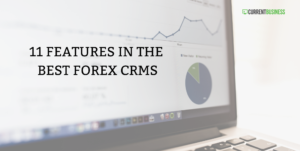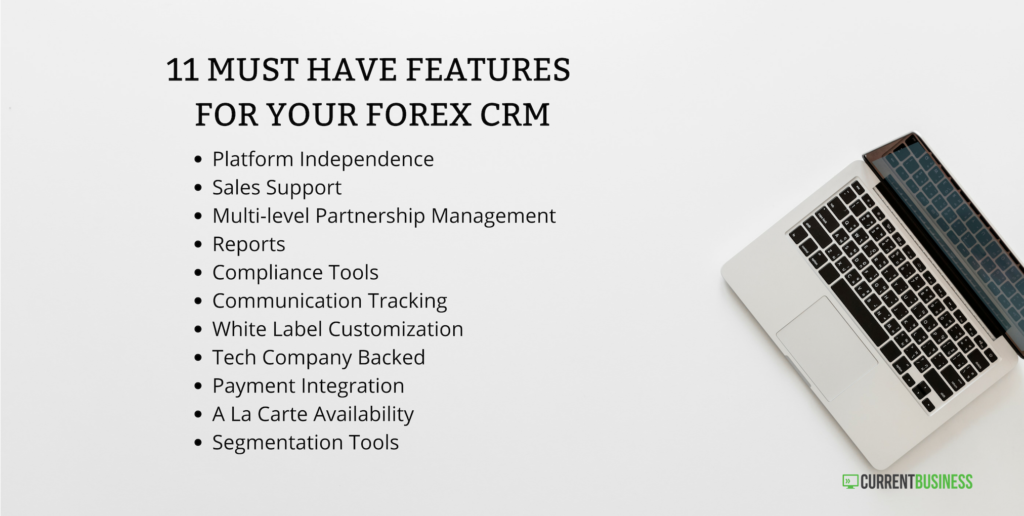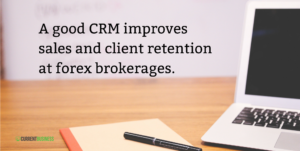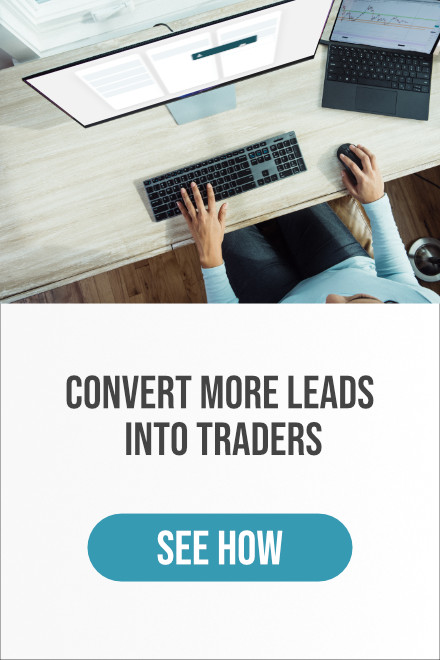11 Features in the Best Forex CRM
What to look for when you choose the best forex CRM for your fx brokerage
A CRM (customer relationship management) tool is a key part of a forex broker’s business. Forex CRM software enables fx brokerages to offer clients excellent customer service and manage IBs and other partners. The best CRMs for forex brokers are more like a complete broker management system, including back office tools, partner portals, and a traders’ room.
We’re a little biased towards our own software, CurrentBusiness, but no matter what FX CRM you choose, make sure to ask about these features before you make a commitment. Keep reading to see why we think these features are so important.
Important CRM features
1. Platform agnostic
As your business needs shift and you expand into new markets, you may wish to offer clients additional trading platforms. However, that can cause software headaches if you haven’t chosen a platform agnostic forex CRM. For example, if you want to offer ZuluTrade in addition to MT4 and MT5, you won’t want to change CRMs just to do that.
2. Sales Support
Making it easy for sales agents and IBs to generate and nurture leads is a central part of any CRM. The software should enable you to keep track of all a lead’s contact information as well as where they are in the sales funnel and how often they’ve been contacted. Ideally, the system should also allow you to track where the lead came from so that you can focus your marketing efforts on the most successful channels.
3. Multi-level partnership management
You need to be able to pay rebates to your introducing brokers and any other partners. If multiple partners are associated with the same clients, then you’ll need a tool that allows you to split rebates or payments so that the appropriate person is paid the correct amount. For that, look for forex software that specifically mentions multi-level partnership management.
4. Reports
With all the information you’ll put into your CRM, it can be a powerful tool for compiling data. It should be simple to generate reports on trading statistics, leads, revenue, dividends, and much more. The CRM should also provide reports that make it easier to comply with the rules in your regulatory environment. Even if you currently operate in an unregulated environment, having these reports is beneficial since regulations can change rapidly. If you’re interested in specific reports, ask about those when the CRM provider is giving you a demo—which they should be eager to do.
5. Compliance tools
Technology that helps financial services companies address regulatory challenges, often called RegTech, should be built in to a good forex CRM. Look for software that allows you to manage KYCs and track whether or not clients have submitted the appropriate documents. Consider how you’d like a CRM to help with KYCs, and ask whether the tool is capable of that during a demo. Integration with an auto KYC provider like SumSub is a hige advantage.
6. Communication tracking
A core part of any CRM should be its ability to improve your relationships with customers. You can do this by keeping detailed records of all communication with a client. CRMs can help you keep track of those records by providing a feature for storing notes. Simply require employees to make a note whenever they have an interaction with a client and to review the notes before they contact a client. This ensures that whenever a trader talks to someone at your brokerage, the employee will be able to accurately speak to what’s happened with their account in the past.
7. White label customization
You want a consistent brand image and voice across your website, social media profiles, and your client portal. To achieve that consistency, look for a CRM that lets you customize the trader’s room with your own logo and color scheme. Then, when clients log in, they see the branding that is familiar to them, which makes your brokerage look more professional.
8. Software company provider
Some companies that offer a CRM for forex brokers are also in the brokerage industry. This can be a significant conflict because you’ll be providing your client data to one of your competitors. To ensure the company proving the forex CRM is devoted to delivering great software, not growing their own brokerage, choose a provider that is solely a software or tech company. The provider’s focus on software will ensure that they have a team of dedicated developers and support specialists in place to help if you have any problems.
9. Payment integration
You want to make it easy for clients to make deposits, because the easier that is, the more likely they are to make their first deposit and then keep trading. Choosing a forex CRM that integrates with payment methods is one way to ensure deposits are simple for clients. When your CRM integrates with payment methods, like bank accounts, Skill, or Neteller, payments are immediately processed, so clients don’t have to wait.
10. A la carte availability
Some CRM providers require you to use a variety of other services they provide, like web development services. Sometimes they require you to use a specific liquidity provider that pays the CRM for providing business. This might seem helpful if you’re just starting out since you won’t need to choose as many services or do things like set up a webpage on your own. However, it also locks you into the rates a single company sets and limits your ability to adapt as your brokerage grows. Instead, look for a forex CRM provider that can introduce you to other service providers to provide assistance on different aspects of your business.
11. Segmentation tools
With many clients making multiple trades per day, you’ll likely be dealing with a large amount of data. Look for a CRM that makes it easy to manage that data. One way FX CRM tools do this is by letting you divide clients based on a wide variety of factors, like country of residence, annual income, or EMIR classification. This can help with client retention efforts, compliance management, and more.
Bonus: Partner Portal
There’s one other thing you should look for in a CRM – a partner portal. Growing your brokerage usually means offering partnerships and accepting new IBs. A CRM with a partner portal lets you empower IBs by giving them access to accounts so that they can help convert leads and support clients making deposits. To make IBs, and your brokerage, successful look for a CRM that gives them a system where they can have more insight into what’s going on with clients.
FX CRM Benefits
When you’re offering similar services to other forex brokers, a good CRM and customer support can make all the difference in attracting leads and reducing churn.
CRMs for fx brokers can also reduce overhead by making it easier to manage KYCs and track important data. When you choose an FX CRM, make sure to consider your brokerage’s needs and ask specific questions about the software during a demo. Choosing the right CRM can make a big difference not only in your profit margins, but also in how easy it is to do your job.





Comments are closed.